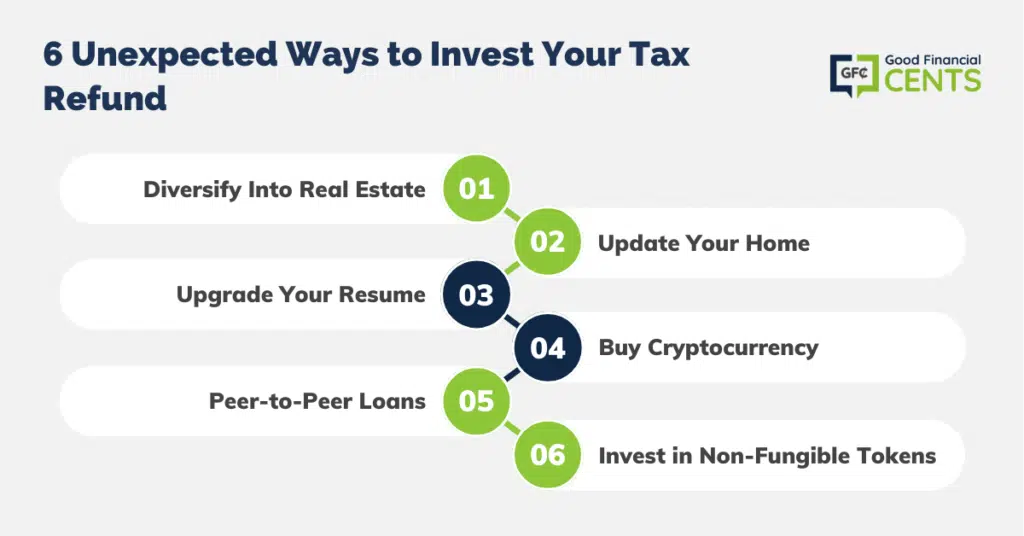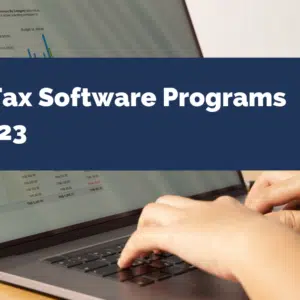Wondering what to do with your tax refund? The average U.S. tax refund is $2,903, according to IRS data, which is a significant boost to your savings or investments if used strategically.
Once you understand the basics of income taxes and are sure your tax return is correct, you can move on to deciding how to spend your refund. Most financial advisors recommend covering the basics first — like boosting your emergency fund, repaying debt, and saving for retirement. But what should you do if you already have those elements covered?
If you like the idea of using your earnings to get ahead in life, your refund — whether it’s a few hundred dollars or a few thousand — can go a long way toward giving you more financial freedom in the future.
There are so many ways to invest $1,000 or less (or more!). Here are some financially savvy ways to use your tax refund to help you reach your money goals.
Table of Contents
1. Diversify Into Real Estate
Buying real estate isn’t always straightforward — especially if you’re a new investor. It can be a drawn-out process and results in owning a property that requires upkeep to earn a return on your investment. If you’re not ready for that step, a different way to invest in real estate is through buying into a Real Estate Investment Trust (REIT).
REITs let you diversify your portfolio, and because they’re listed on major stock exchanges, they’re easy to get into. You simply buy shares in them, similar to any other stock. This real estate investment option pays dividends, and they’re obligated to disperse a minimum of 90% of their taxable income to shareholders.
2. Update Your Home
Homeowners probably won’t be able to get a new roof or build a garage with their tax refund, but your refund can still add value to your property.
Not only that but spending money on home maintenance could help you save on your budget throughout the rest of the year. For example, new windows or insulation can reduce your heating or cooling costs — data shows replacing your older windows with energy-efficient models can reduce your heating bill by 45%.
Another way to update your house and save money is by adding new security features, which can reduce your home insurance premium.
Just remember that sometimes, the flashiest home improvement projects have the lowest return on investment when it comes time to sell your home. If you’re truly trying to add value to your home to improve it for resale, talk to a real estate agent in your area to learn which features are likely to increase your home’s value in your neighborhood. These features could be different for every city in the country, so it’s important to talk to someone who has actual insight into what’s selling in your market.
You can back up those insights by referring to Remodeling Magazine’s Cost vs. Value report, which is one of the country’s most extensive databases of home improvement projects compared to resale values.
3. Upgrade Your Resume
You don’t have to rely solely on your investments to help you earn more. Earning a raise or getting a new job with higher pay is just as important — and you can put your tax refund to work to accomplish that.
If you want to add a new skill to your toolbox or achieve a new designation that would qualify you for a different role, using your tax refund on educational opportunities is smart.
Even free online courses statistically help job seekers improve their prospects. Seventy-two percent of survey respondents in a Harvard Business Review study reported job benefits from open enrollment classes.
If you want to allocate some of your tax funds to improve your talents, consider both classes and networking opportunities (e.g., conferences). These help you become more legitimate in your field and establish crucial relationships for career advancement.
4. Buy Cryptocurrency
Cryptocurrencies like Bitcoin are one of the most buzzed-about topics in investment circles today, they’re created using digital codes on the blockchain. Consider them like electronic cash. Cryptocurrencies are volatile and, as such, have a massive potential for returns — but also for losses.
Investing in crypto is easier as the space has matured. Nowadays, you can buy some of the most popular currencies via an online exchange, such as Coinbase or Binance. You can buy cryptocurrencies using almost any other currency, including other cryptocurrencies. Similar to buying traditional cash, the exchange rate varies.
Not every exchange offers the same variety of altcoins, so if you want to invest in something other than Bitcoin, be prepared to evaluate less popular exchanges based on their safety. Also, every exchange charges fees, so compare the specific fee structures of your top exchanges before moving forward with your investment.
5. Peer-to-Peer Loans
Peer-to-peer lending, also referred to as “P2P investing”, is growing in popularity. This option is ideal for investors who are comfortable with more risk and are seeking potentially higher returns than safer investments, like the bond market. Popular peer-to-peer lender Prosper says its historical returns for investors are 5.7%.
With peer-to-peer lending, you use a platform to make an unsecured personal loan to another consumer. Depending on what platform you choose, there are several ways to loan your money. Typically, you choose between investing in either whole loans or fractional loans, and you can choose a variety of different risk levels.
Loans to people with lower credit are riskier but could have a higher return.
To get started, apply for an investing account on your platform of choice. Then, fund your account before choosing which loan requests to approve.
6. Invest in Non-Fungible Tokens
Cryptocurrency isn’t the only digital asset in town. If you’re looking for a creative way to invest your tax refund, consider buying non-fungible tokens (NFTs). Like cryptocurrencies, NFTs are traded on the blockchain.
However, it’s not a currency; it’s a digital asset that represents both physical and digital purchases, like digital artwork. They’re not interchangeable; they’re each unique. Think of an NFT like a rare baseball card, just one that you can’t counterfeit.
NFTs became popular in the gaming world because they allowed gamers to amass collections of digital items that are useful in their games. They can even help users monetize their gameplay in some instances.
It’s not new to many investors, but it’s gaining legitimacy and popularity. For example, on February 25, 2021, Christie’s became the first-ever auction house to sell digital artwork via NFTs. You can make money on NFTs by purchasing and reselling them, although you might have to wait long-term for your investment to increase in value.
It’s easy to get started buying NFTs; for example, you can buy NFTs on the WAX blockchain by creating a WAX Cloud Wallet (WCW) using your social media profile. Or, you could use a platform like Top Shot, which accepts United States dollars, or OpenSea, which accepts cryptocurrencies.

Is Your Tax Refund Too Large?
Common sense says there’s no such thing as too much money. However, common sense isn’t always spot on, especially when the subject is taxation.
Getting a huge refund means the government has been holding on to a lot of your money all year. That’s OK if you enjoy the windfall of a refund every winter or early spring.
But if you’d rather have the freedom to use your own money the way you want all year, consider changing your withholdings at work or as you’re doing your own taxes if you’re self-employed. Your human resources department can help.
For example, you could be investing your income all year and earning interest. In contrast, Uncle Sam doesn’t pay interest on your money when the IRS holds onto it until refund time.
The opposite can also be true: If the government didn’t withhold enough of your income, you could have a tax bill this year instead of a refund. Access your budget throughout the year and see whether adjusting your income tax withholdings is more advantageous than a lump sum tax refund.
The Bottom Line – 6 Unexpected Ways to Invest Your Tax Refund
In exploring various avenues for utilizing a tax refund, it’s evident that opportunities abound. Whether you’re looking to dip your toes into the realm of real estate with REITs, bolster your home’s value, advance your career, or delve into the digital age of investments with cryptocurrencies and NFTs, there’s a pathway tailored for every financial aspiration.
Even traditional peer-to-peer lending offers a way to grow one’s refund. However, it’s vital to reassess if a large refund is in your best interest. Rather than letting the government hold onto your funds, adjusting your withholdings could offer year-round financial flexibility and potential growth.








